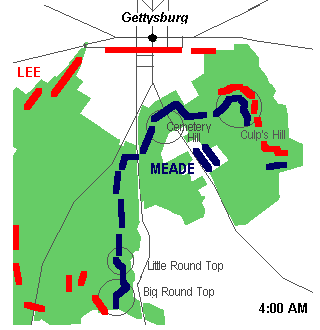Gettysburg: July 3 - "I will strike him there..."

|
| Once the fighting at Culp's Hill had ended, Lee con- concentrated his efforts on breaking the Union center. |
The Most Memorable Charge of the War.
Intense fighting erupted on Culp's Hill at 4 AM on July 3, and by 11 AM Union troops had secured the hill, firmly anchoring the point of the Union "fishhook" line. With the loss of his advantage at Culp's Hill, Lee decided to alter his strategy. Having already ordered his cavalry chief, "JEB" Stuart, to ride around the Union position and attack the Union supply line, Lee decided to strike what he thought to be a weakened Union center on Cemetery Ridge where he observed few troops and only a handful of batteries. If this section of Meade's line collapsed, it would threaten the Union rear and those strong hill positions. He issued orders for a massive bombardment aimed at this area followed by an assault of 18,000 men, coordinated and commanded by his trusted corps commander General James Longstreet. Longstreet's Assault, better known today as "Pickett's Charge", would be Lee's last gamble at Gettysburg.
At 1 o'clock, two guns stationed in the Peach Orchard fired the signal to begin the bombardment. Over 150 Confederate guns on Seminary Ridge simultaneously exploded, sending shot and shell toward Cemetery Ridge. Startled Union artillerymen sprang to their guns and soon both ridges were covered with thick, acrid smoke. The pounding of the guns in the great duel shook the earth for nearly an hour, when the Union fire finally slackened. Longstreet reluctantly gave the order for the infantry to advance and nearly 12,000 Confederate soldiers began the long march toward the Union line. Suddenly the Union artillery came back to life, blasting the formations and cutting large swaths through them. As they reached the Emmitsburg Road, they were startled by the blast from hundreds of Union muskets. Officers were replaced by captains and sergeants, urging the men on until they reached "the Angle". Brig. General Lewis Armistead, the lone unscathed general of Pickett's Division, pierced the Union center with about 300 men. This was the "High Water Mark" and the last great Confederate gamble for victory.
North of the Angle, troops under Generals Pettigrew and Trimble reached the Emmitsburg Road to attack the Union line between Pickett's command and Ziegler's Grove only to meet a solid wall of musketry and artillery. Groups of Confederates leapt the fences and forged ahead, melting away as they surged forward. All along the line the attack ground to a halt. Those who were able retreated in disorder back to Seminary Ridge. Pickett's Charge had failed.
General Meade rode onto the scene just as the last shots died away and was informed by a staff officer that the southerners had been whipped. His army had done the unthinkable- beaten Robert E. Lee and the best troops he could throw at them. The tired general managed to utter a hoarse "Hurrah!", then rode on to inspect the line.
General Lee witnessed the southern tide crest. Afterward, he spoke with the survivors, calming them with words of encouragement and preparing them for the Union counterattack that was sure to come. Within the hour, a courier informed Lee of JEB Stuart's defeat three miles east of Gettysburg at what is known today as East Cavalry Field. Stuart successfully marched east of Gettysburg and turned his force south where they encountered a strong Union cavalry force blocking the Hanover Road. A spirited battle ensued with troopers of both armies fighting on foot and horseback. Southern charges meant to slice through the Union line were stopped cold by Union cavalrymen led by Brig. General George Armstrong Custer. His attempt to raid the Union rear thwarted, Stuart withdrew and retired toward Gettysburg.
Lee realized his army could no longer remain in Pennsylvania. Returning to his headquarters, he dictated orders for the army to withdraw, retreat to the Potomac River, and return to Virginia. "Too bad, too bad," a staff officer heard the general say in his discouragement. "Oh, too bad."
Storm clouds blackened the early evening sky. A heavy rain soon fell, symbolically washing the land of the carnage wrought by three days of bloody battle.